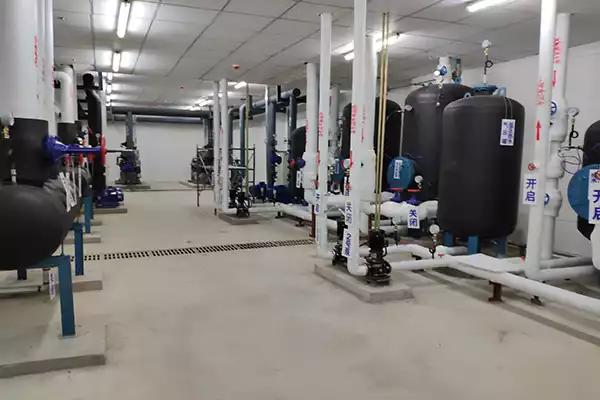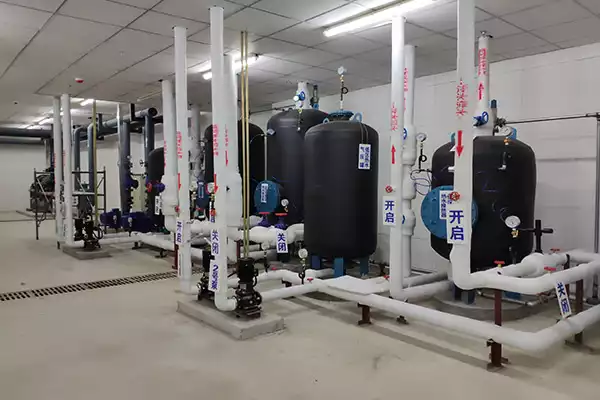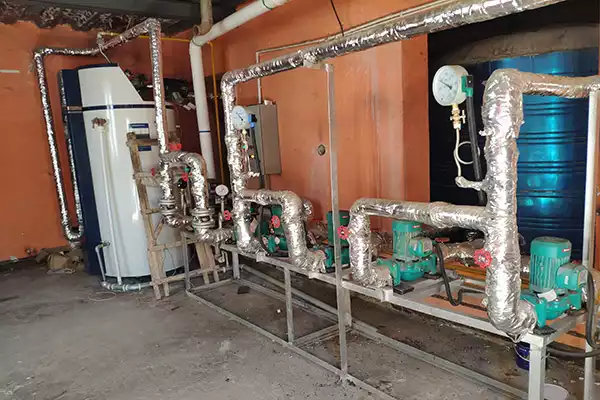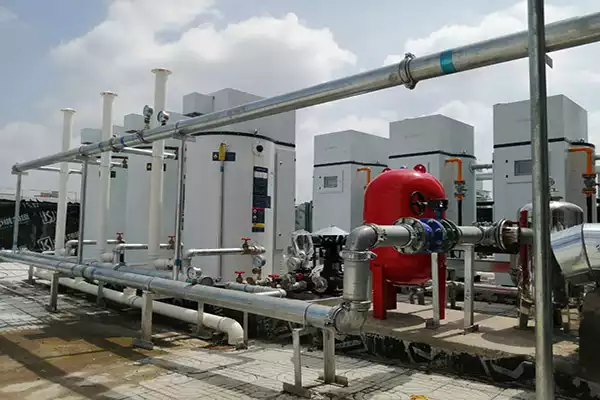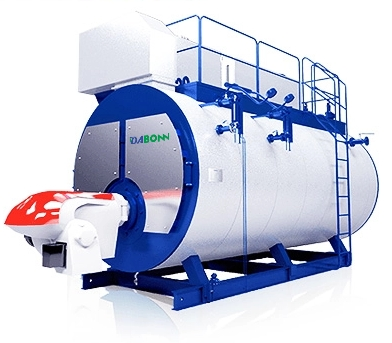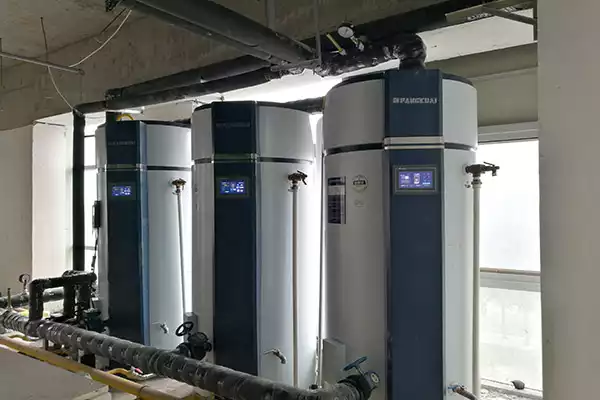
What is a System Boiler?
A system boiler is a type of central heating boiler that is part of a larger heating system. It’s a popular choice for homes and buildings where a consistent and efficient supply of hot water and heating is required. Unlike conventional boilers, which store hot water in a separate cylinder, a system boiler incorporates the pump and expansion vessel within the unit itself. This makes it more compact and easier to install compared.
How Does a Boiler Heating System Work?
A boiler heating system functions by heating water, usually with natural gas, oil, or electricity, in a boiler unit. When the thermostat calls for heat, the boiler’s burner or heating element ignites, heating the water to a predetermined temperature. This hot water is then circulated through pipes to heat emitters like radiators, providing warmth in rooms. Simultaneously, the system may store or heat water on demand for domestic use. When the desired indoor temperature is reached, the boiler ceases operation until further heating is required, thus maintaining comfort and efficiency.
What are the Different Types of Boiler Systems?
There are several types of boiler systems, including:
- System Boiler: As previously explained, it integrates key components and is suitable for homes with higher hot water demands.
- Combi Boiler (Combination Boiler): Combi boilers provide both heating and hot water on demand without the need for a separate hot water cylinder. They are space-saving and suitable for smaller homes.
- Regular Boiler (Conventional Boiler): Regular boilers work in conjunction with a separate hot water cylinder and are often used in older homes with existing heating systems.
- Heat-Only Boiler: A heat-only boiler, also known as a conventional or regular boiler, only provides heating and requires a separate hot water cylinder. They are commonly used in homes with multiple bathrooms.
- Electric Boiler: These boilers use electricity as their heat source and are suitable for homes without access to gas.
How Many Pipes Does a System Boiler Have?
A system boiler typically has two pipes connected to it:
- Flow Pipe: This pipe carries hot water from the boiler to the heating system, such as radiators or underfloor heating.
- Return Pipe: The return pipe brings cooled water back from the heating system to the boiler, where it gets reheated.
These pipes create a closed-loop system, allowing for the circulation of hot water to provide heating and hot water throughout the building.
What is the Difference Between a System Boiler and a Regular Boiler?
The primary differences between a system boiler and a regular boiler are:
- Integration of Components: A system boiler integrates key components like the pump and expansion vessel, making it more compact and easier to install compared to regular boilers that require additional components and space for a separate hot water cylinder.
- Hot Water Storage: They store hot water in a cylinder, ensuring a ready supply of hot water at mains pressure, while regular boilers require a separate hot water cylinder.
- Space and Installation: System boilers are often a preferred choice for homes with limited space or where retrofitting a heating system is necessary due to their compact design and simplified installation.
What is the Difference Between a System Boiler and a Combi Boiler?
System boilers and combi boilers both provide hot water and heating, but they differ in several ways:
- Hot Water Storage: A system boiler uses a separate hot water cylinder to store hot water, ensuring a ready supply at mains pressure. In contrast, a combi boiler heats water on demand and does not require a separate cylinder.
- Space: Combi boilers are compact and do not require as much space as a system boiler with a hot water cylinder, making them suitable for smaller homes.
- Hot Water Flow Rate: System boilers can provide higher hot water flow rates, making them better suited for homes with multiple bathrooms and higher hot water demand.
- Installation: System boilers may be more complex to install due to the need for a hot water cylinder, whereas combi boilers are often easier and quicker to install.
The choice between a system boiler and a combi boiler depends on the specific requirements of your home and your hot water usage patterns.
What’s the Difference Between a System Boiler and Heat Only?
A system boiler and a heat-only boiler (also known as a regular or conventional boiler) are similar in that they both require a separate hot water cylinder. However, the main difference lies in the way they provide heating:
- System Boiler: It integrates some of the heating system components within the boiler unit itself, including the pump and expansion vessel. This integration can save space and simplify installation compared to a heat-only boiler.
- Heat-Only Boiler: A heat-only boiler, also known as a regular or conventional boiler, relies on external components to circulate hot water through the heating system. It does not have an integrated pump or expansion vessel. Here are some key distinctions between the two:
- Integration of Components: As mentioned earlier, it integrates important heating system components within the boiler unit. In contrast, a heat-only boiler relies on external components, including a separate pump and expansion vessel, which are typically installed alongside the boiler.
- Hot Water Cylinder: Both system boilers and heat-only boilers require a separate hot water cylinder to store and supply hot water for domestic use. This cylinder is often located in an airing cupboard or another designated space within the property.
- Space and Installation: They are generally more compact and streamlined because they include certain components within the boiler unit. This can make them a more space-efficient option compared to heat-only boilers, which require additional space for the external components.
- Complexity of Installation: Heat-only boilers may require more complex installation due to the need for separate external components. This can result in a longer and potentially more costly installation process. System boilers, on the other hand, are often quicker and more straightforward to install.
- Hot Water Performance: Both types of boilers can provide a consistent supply of hot water. However, they are known for delivering hot water at mains pressure, ensuring strong water flow from taps and showers. Heat-only boilers can also provide good hot water performance, but the flow rate may be influenced by factors such as the height of the hot water cylinder above the taps.
The choice between a system boiler and a heat-only boiler depends on your specific heating and hot water requirements, as well as the available space for installation. In some cases, the existing heating system and infrastructure of the property may also influence the choice.
What are the Advantages of a System Boiler?
System boilers offer several advantages, including:
- Space Efficiency: They are more compact and self-contained compared to traditional regular boilers, making them suitable for homes with limited space.
- Strong Hot Water Flow: They can deliver hot water at the main pressure, ensuring a strong flow rate from taps and showers. This makes them suitable for homes with multiple bathrooms and high hot water demand.
- Efficiency: Due to their integrated components, they are often more energy-efficient than regular boilers, leading to potential cost savings on energy bills.
- Easy Installation: They are typically easier and quicker to install, especially when replacing an existing system or retrofitting a heating system.
- Consistent Heating: They provide consistent and even heating throughout the building, ensuring a comfortable living environment.
- Hot Water Storage: They store hot water in a separate cylinder, so there’s always a readily available supply for domestic use.
- Compatibility with Renewable Energy: They can often be integrated with renewable energy sources like solar thermal panels to further reduce energy consumption.
What are the Disadvantages of a System Boiler?
While system boilers offer numerous benefits, there are some potential disadvantages to consider:
- Hot Water Cylinder: They require a hot water cylinder, which takes up space and may need to be accommodated in an airing cupboard or another designated area.
- Installation Costs: While installation is generally easier than with regular boilers, there may still be costs associated with installing the hot water cylinder and associated pipework.
- Hot Water Recovery Time: In periods of high hot water demand, the hot water cylinder may take some time to recover and reheat water, leading to temporary supply limitations.
- Space for Cylinder: The hot water cylinder requires dedicated space within the property, which may not be suitable for all homes.
- Initial Cost: They tend to have a higher upfront purchase cost compared to some other types of boilers.
What Size System Boiler Do I Need?
The size of the system boiler you need depends on factors such as the size of your property, the number of bathrooms, and your heating and hot water requirements.
A qualified heating engineer or installer can help you perform this calculation and recommend a system boiler with the appropriate heat output (measured in kilowatts or BTUs) to meet your needs efficiently. Choosing the right size ensures that your system operates effectively and avoids unnecessary energy consumption. The table below is some reference advice.
| House Area (square feet) | Hot Water Demand | Recommended Boiler Size (BTUs) |
|---|---|---|
| Up to 1,000 | Low | 20,000 – 30,000 |
| Medium | 30,000 – 40,000 | |
| High | 40,000 – 50,000 | |
| 1,000 – 1,500 | Low | 30,000 – 40,000 |
| Medium | 40,000 – 50,000 | |
| High | 50,000 – 60,000 | |
| 1,500 – 2,000 | Low | 40,000 – 50,000 |
| Medium | 50,000 – 60,000 | |
| High | 60,000 – 70,000 | |
| 2,000 – 2,500 | Low | 50,000 – 60,000 |
| Medium | 60,000 – 70,000 | |
| High | 70,000 – 80,000 | |
| 2,500 – 3,000 | Low | 60,000 – 70,000 |
| Medium | 70,000 – 80,000 | |
| High | 80,000 – 90,000 | |
| 3,000+ | Low | 70,000+ |
| Medium | 80,000+ | |
| High | 90,000+ |
Conclusion.
That’s all there is to know about system boilers. If you want to save money on your heating bills and have a more eco-friendly system, then we recommend that you get it. They are more efficient than regular boilers and can save up to 40% on your heating bills.
FAQs.
What is the use of a system boiler?
The primary purpose of a system boiler is to provide hot water and heating to a building or residence. It works in conjunction with a central heating system that typically includes radiators, underfloor heating, or other heat emitters.
How does a boiler heating system work?
A boiler heating system works by heating water, which is then circulated through radiators or underfloor heating systems to provide warmth. In the case of a system boiler, the hot water is stored in a cylinder and distributed as needed.
Is the system boiler more efficient?
System boilers are known for their efficiency. Since they integrate key components like the pump and expansion vessel, there's less heat loss compared to regular boilers. Additionally, they can provide hot water at mains pressure.
What temperature should a system boiler be set at?
A common practice is to set the system boiler's thermostat to around 70-80°C (158-176°F) for heating purposes. For hot water, the thermostat may be set slightly higher, around 60-65°C (140-149°F).
How much does a system boiler cost?
On average, the cost of a system boiler can range from $1,500 to $4,000 or more. The total cost will also depend on any additional components or upgrades needed for your heating system.
Get your best price
Quickly compare 3 FREE quotes
- Engineer quick quote
- The overall delivery speed is fast
- Financial choice
- Low installation costs and cost savings
25 years+ of boiler R&D
More than 20 innovative technologies
